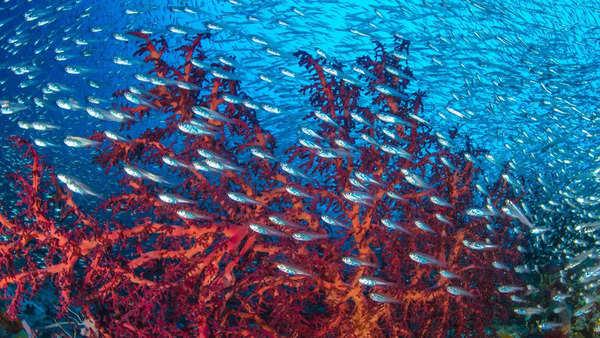Recent findings have raised significant concerns about the state of our oceans. A report from the Potsdam Institute for Climate Impact Research (PIK) has highlighted that ocean acidification is nearing a critical threshold. This development poses a severe threat to marine life and ecosystems. The report, released on September 23, 2024, outlines that the world’s oceans are becoming increasingly acidic due to the absorption of carbon dioxide (CO2) emissions from human activities.
Boris Sakschewski, one of the lead authors of the report, explained that as CO2 emissions rise, more of it dissolves in seawater, leading to higher acidity levels.This process, known as ocean acidification, disrupts the delicate balance of marine ecosystems. Even with rapid emission cuts, some level of continued acidification is unavoidable due to the CO2 already emitted and the time it takes for the ocean system to respond.

Representative image
The report identifies nine planetary boundaries that are crucial for maintaining Earth’s stability. Six of these boundaries have already been exceeded, and ocean acidification is on the verge of becoming the seventh. The other boundaries include climate change, loss of biodiversity, and the disruption of biogeochemical flows. The only boundary not close to being breached is the state of the planet’s protective ozone layer.
Ocean acidification has dire consequences for marine life. Acidic waters damage corals, shellfish, and phytoplankton, which are essential components of the marine food web. Corals, for instance, struggle to build their calcium carbonate skeletons in acidic conditions, leading to weakened reef structures. Shellfish, such as clams and oysters, also face difficulties in forming their shells, making them more vulnerable to predators and environmental stressors.
Phytoplankton, the foundation of the marine food chain, are also affected by acidification. These microscopic organisms play a significant role in carbon sequestration and oxygen production. Their decline could disrupt the entire marine ecosystem, affecting species that rely on them for food, including fish and marine mammals.
The implications of ocean acidification extend beyond marine life. The oceans absorb about 25% of all CO2 emissions and capture 90% of the excess heat generated by these emissions. If the oceans become too acidic, their ability to perform these functions diminishes, exacerbating global warming and climate change.
Levke Caesar, a climate physicist at PIK and co-author of the report, emphasized the interconnectedness of the nine planetary boundaries. He noted that the current conditions might already be problematic for various marine organisms, suggesting a need to re-evaluate what levels can be considered safe. The report underscores the urgency of addressing CO2 emissions to prevent further damage to marine ecosystems and the broader climate system.
The findings of the PIK are a blaring red alarm about the state of our oceans and the urgent need for action. The continued rise in CO2 emissions from fossil fuels like oil, coal, and gas is pushing the oceans toward a tipping point. Without significant efforts to reduce emissions and mitigate the impacts of acidification, the future of marine life and the health of our planet remain in jeopardy.
Why are women more at risk for heart disease?






